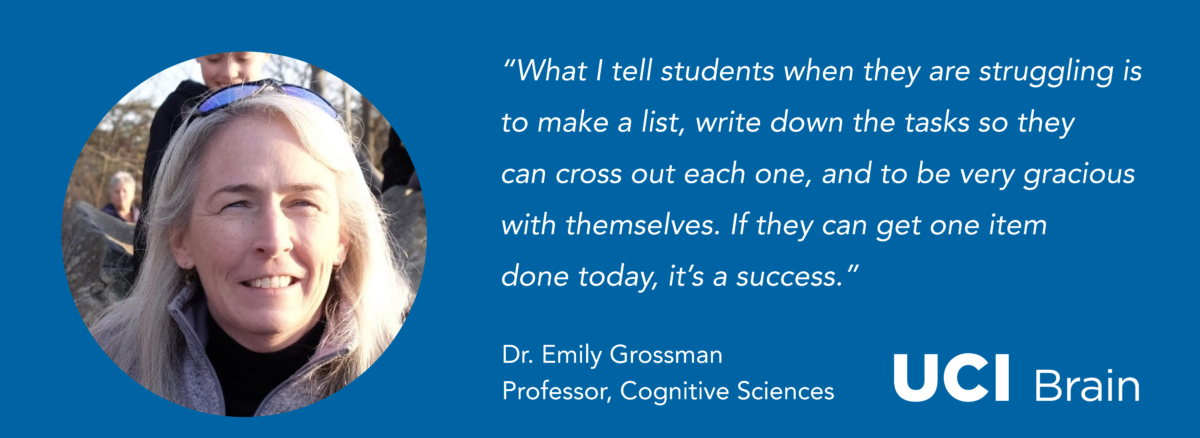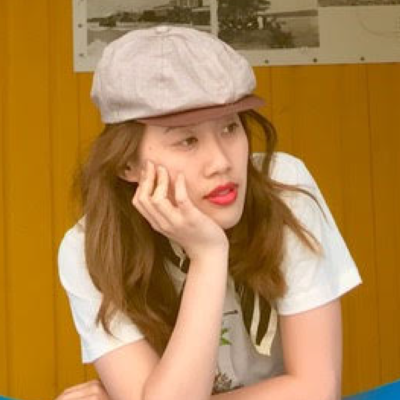Researcher Spotlight: Dr. Emily Grossman

Interview and written by Xiaojue Zhou
I invited Emily Grossman, a full professor in the cognitive sciences department at University of California, Irvine, to chat about how students can achieve their goals during the COVID-19 pandemic. Professor Grossman has been serving as a DECADE faculty mentor for five years and is involved in training both undergraduate and graduate students. We chatted about Professor Grossman’s career in science and key tips to succeed in an academic field.
What was your journey to become an associate professor at UCI?
I went to a state school that was much smaller than UCI and focused more on undergraduate education. I had two amazing mentors. One in perception science and one in cognitive science. I got involved in research early, in my second year, and they both mentored me. They guided me to make good choices for graduate school based on the quality of mentorship. When I went to Vanderbilt for my PhD, I also had a great mentor. One of the things I did at Vanderbilt was networking. There were two of us that went to every single lunch with every single outside speaker. And then when it came time to find a postdoc position, I had a lot of choices and it was very helpful. I went to postdoc at Harvard for two years and then I came to UCI. My only academic faculty position has been at UCI.
Has there been significant changes in your field?
One big change I noticed is that funding agencies have many more opportunities for junior faculty. When I started there was one, the career grant from NSF which is a great funding opportunity. Now NIH also offers K awards that are for transitioning young faculty. I think that’s important. One of the things I don’t think is good is that scientists are doing longer postdocs. So, having the opportunity to apply for funding during that time is important for career success. I feel like the field has gotten better at recognizing the things they need to do to nurture the postdoc to faculty pipeline. Here at UCI, there is a lot of attention to supporting young faculty. For example mentoring programs and work-family balance, which I don’t think is everywhere. I think that’s very positive.
What’s your favorite part of being a professor at UCI?
I feel really lucky to be at UCI. My favorite part of UCI is definitely the undergraduates. They have strong work ethic. They are very smart and they are very kind towards each other. They are wonderful to work with.
What kind of advice do you have for someone who is thinking about going into research? How can they achieve their goal?
For undergraduates, I always encourage them to think about their quality of life. Is it important to stay in southern California or they are interested in living in other parts of the world? Is it important that they make wealth now or later? Are they ok with having a job where you sit in front of the computer all day or do they want to work with people? I encourage students to think about those things, because it’s hard to be successful if you are not happy at your job. For graduate students, I emphasize that success in science relies on publications. I encourage students to ruthlessly prioritize publishing their work so their time and thinking get accounted for. The other thing is networking and getting to meet people from other institutions because your job is going to be outside of your university.
To follow up on that, in industry nowadays a lot of interesting jobs often require a PhD. What do you think about the surge of people coming into a PhD program?
It depends on what you need. If having autonomy is what you need, then get a PhD because that’s what it brings you. The joke about me when I was a toddler was that I always said, “Don’t tell me what to do. I will do it by myself.” So, I need autonomy in my job in order to flourish. A PhD is important for that. For some people it is more important to know exactly what they are supposed to do. At five o’clock they have completed their tasks and can put them away, in which case they don’t need a PhD because their tasks are delegated. Their work might be very intellectually demanding, creative, or technical but they don’t need the autonomy. I also think a lot of PhD training is about independent thinking. In a bigger company it’s harder to stand out. In a smaller company you can potentially make more of an impact. So, those smaller organizations may have less opportunity to move up, but your contribution is more substantial. There is a trade-off there.
During the COVID-19 pandemic, what are some struggles you observed that students have been going through. What kind of advice would you give to those students?
Many students are struggling with mental health issues. More students are struggling with motivation and transitioning to independent learning. Even more students are struggling with a distracting learning environment, parents and siblings. In general, school time is less protected from family and work obligations so there is a lot more multi-tasking. I also think that pedagogy is not as good because there is less communication with students and most faculty are not trained for online learning. A lot of faculty are using the same strategies for teaching that they used in the live classroom. In my opinion, those are not as effective online. You have to really do things differently in order to give a high-quality experience. So, students are in a situation where they have to work harder to learn, and how they are being taught is often not as effective. They are doing this is an environment where their education may not be prioritized. Even if they themselves are prioritizing it, the people around them are making that difficult. And there’s a lot of unexpected ways that mental health issues are creeping in. It’s really hard.
What I tell students when they are struggling is to make a list, write down the tasks so they can cross out each one, and to be very gracious with themselves. If they can get one item done today, it’s a success. I try to not have them look ahead five weeks. Even one week is too far. Just think about today and tomorrow. Set little goals that are very achievable. It’s not even about the feeling of success, it’s about avoiding the feeling of distress from not achieving the goals. Also, not letting them sit down for three hours and just spin. I suggest 45 minutes at most and then get up and walk away for a while. Even if you just read one paragraph for 45 minutes. Fine, but get up, otherwise it just eats you up. For me it’s just about breaking things down into smaller and smaller pieces that are achievable and narrowing your focus into a manageable period of time. If it’s very serious distress, planning ahead two days is way too long. It could just be this afternoon, half a day. You can’t plan in distress. Your brain is not in an optimal state. Setting little goals is one of the ways to crawl out of this state.
For a long time, I didn’t know how to prioritize. Then I realized I just need to finish my top priority during a bad week and that’s all I need to do. I don’t need to be too ambitious.
I think being overly ambitious is actually kind of dangerous. When students are in distress, then being overly ambitious can be seen as a way out. But in fact, it’s more distressing because it’s harder to achieve and it hurts more when you don’t get there. It’s part of the downward spiral. The key to success is to be less ambitious, but that has to come with prioritizing. So, you have to be so clear about what the most important things are. Sometimes you can’t do that alone. Sometimes you must get a good friend to tell you, “Really, is that important right now?” And then you will realize “Oh, well you’re right. That’s not important right now.”
How can I measure achievement? If I start with one task in an ambitious plan, how do I know how far I should go so I don’t waste my time?
I think that is a very personal choice in the sense that there are many approaches that could be successful. I will tell you that I am a very cautious person. When I have a big project, I like to build in little break points along the way, so there is an escape route if it’s not working. Or there is a way of taking the project to a point when, this whole thing might not work but I still have this piece that I can fall back on. It takes planning, sometimes it’s hard to achieve, also it’s a very cautious way. Lots of people have a different risk threshold and would not take that approach. They would go whole hog into the project and you know they would say: “it’s totally worth it. I just really put my head down and really got it.” I can’t do that but other people can. And they are probably very successful. So that’s why I said there’s multiple ways.
Following up on that, I often find myself procrastinating. What are some signs to look out for or a method to combat?
If you have a big goal and you find yourself not working on it, that’s a problem. I would say a good management strategy is to have a collaborator, because when people dive into project independently, they tend to develop tunnel vision. A good collaborator will challenge your thinking. A good collaborator will think differently than you and identify the weakness in your plan and tell you. Some people identify the weakness and don’t tell you because they want to be nice. A good collaborator will question you along the way and help to redirect you. That’s the best way to avoid catastrophic failures.
To learn more about Dr. Grossman, please visit the Visual Perception and Neuroimaging Lab website.

About Xiaojue Zhou
Xiaojue is a PhD student at Cognitive Sciences department and a member of the communications committee in the Center for the Neurobiology of Learning and Memory Ambassadors program. She’s interested in understanding action observation in a complicated environment using neuroimaging data.
